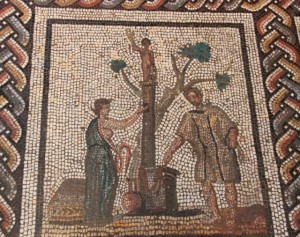Between Life and Death (Catullus 101)
Like the recently dead, mourners also come to reside in a transitional state between life and death, argues Ali Becker. Her careful reading of Catullus’ poem on the death of his brother connects the text with Roman funeral customs and beliefs about the afterlife. Drawing especially on the work of Andrew Feldherr (“Non inter nota sepulcra: Catullus 101 and Roman Funerary Ritual,” Classical Antiquity 19.2 [2000], pp. 209-231)
she notes how by Catullus’ vivid but carefully restrained language takes us with him into that state of grief-stricken isolation.
Multās per gentēs et multa per aequora vectus
adveniō hās miserās, frāter, ad īnferiās,
ut tē postrēmō dōnārem mūnere mortis
et mūtam nēquīquam alloquerer cinerem,
quandoquidem fortūna mihī tētē abstulit ipsum,
heu miser indignē frāter adēmpte mihi.
Nunc tamen intereā haec, prīscō quae mōre parentum
trādita sunt trīstī mūnere ad īnferiās,
accipe frāternō multum mānantia flētū,
atque in perpetuum, frāter, avē atque valē.

Sarah Said,
May 8, 2015 @ 10:16 am
Great thoughts on the placement of Frater!